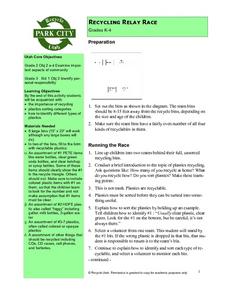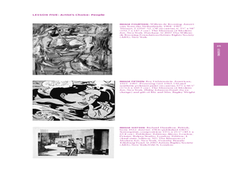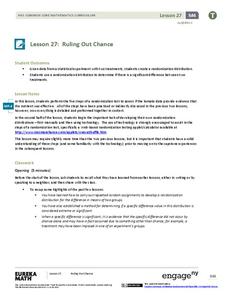Curated OER
LOOKING AT LAWNS
Students investigate the importance of plants to animals by exploring their own schoolyard. They record relevant observations, findings, and measurements, using written language, drawings, charts, and graphs. They describe ways in...
Curated OER
Recycling Relay Race
Students identify the reasons why recycling is important. In this recycling lesson, students practice sorting plastics into categories using recycling bins and types of plastics.
Curated OER
The Constitution: The Country's Rules
Learners become aware of the Constitution and why it is important. In this early government lesson, students compare the Constitution to the class rules. They are both set in place so that we all stay safe and have fun. Learners draw...
Curated OER
What Role Do Forest Play in Continuing or Renewing Our Planet's Resources?
Students explore the interaction between the forest and wildlife. In this forestry lesson, students collect data about forest ecosystems, species of trees, photosynthesis, and interaction of organisms. They prepare a lab activity to...
Curated OER
Art and Politics
Students analyze the work of three artists whose art work illustrates important political and social events. For this art analysis lesson, students analyze the art of Jasper Johns, Charles Moore, and Andy Warhol. Students complete image...
Curated OER
Responsibility in Leadership
Students identify ways responsibility is important to productive leadership. In this leadership instructional activity, students discuss responsibilities of leaders and work in groups to create a list of do's and don'ts for being...
Curated OER
Symbols of Canada Lesson
Learners examine the most common symbols of Canada and explain their importance. In this Canadian culture lesson, students identify the beaver, maple leaf, and Inuksuk and discuss why Canada feels these are representative symbols of...
Curated OER
He Sees it in His Joy
Students research the importance of play. In this research lesson, students work in pairs and interview each other about their 'play history.' Students take data from the interview and shape it into a play history for the individual....
Curated OER
Water Lesson Plan
Young scholars discuss the importance of water in our daily lives. In this physics activity, students calculate the pressure of water tower systems. They investigate the effect of certain variables using a computer simulation.
K-5 Math Teaching Resources
Days of the Week
Bring some order to young children's understanding of the days of the week with this set of printable word cards. Though very simple, the uses of these classroom displays are limited only by your creativity and imagination.
Kenan Fellows
Determining Stream Health by the Diversity and Types of Benthic Organisms
How diverse are the benthic organisms found in local streams? Using the information learned in previous lessons on identification of macroinvertebrates and on calculating stream index values, groups determine the health of local...
Curated OER
Islamic Civilization
Use this simple graphic organizer to summarize the key points of Islamic civilization, including laws and dogma, the status of women and slaves, motivations for converts, and the re-centering of the Islamic people.
American University
Factitious
Truth or factitious? Users of an engaging interactive test their ability to identify whether an article is real or fake news.
American Museum of Natural History
Make Your Own Astronomy Stationary
Scholars follow five steps to create personalized, astronomy-themed stationary.
EngageNY
Ruling Out Chance (part 3)
Pupils analyze group data to identify significant differences. They use simulation to create their own random assignment data for comparison.
EngageNY
Incredibly Useful Ratios
Start the exploration of trigonometry off right! Pupils build on their understanding of similarity in this lesson that introduces the three trigonometric ratios. They first learn to identify opposite and adjacent...
EngageNY
The Long Division Algorithm
Two methods are always better than one! The eighth installment in this series asks pupils to convert decimals to fractions using two approaches. Individuals first use the more traditional approach of long division and then use reverse...
Drexel University
Learning Roomba Module 2: Robot Configurations
How do robots move? A presentation shows viewers the different types of configurations of that help robots move and lists the advantages and disadvantages of each of the configurations.
EngageNY
Increasing and Decreasing Functions 1
Model situations with graphs. In the fourth installment of a 16-part module, scholars learn to qualitatively analyze graphs of piecewise linear functions in context. They learn to sketch graphs for different situations.
Teach Engineering
Energy Perspectives
The data says ... the resource is great to use. Using Microsoft Excel, pupils analyze data from the US Department of Energy in the fifth lesson of a 25-part Energy Systems and Solutions unit. Each group looks at a different data set and...
1 plus 1 plus 1 equals 1
I Can Read! Sight Words Set #13
Take the first steps to reading fluency with a set of language arts activities. Kids work on the sight words pretty, ran, so, and out with tracing worksheets and matching games.
EngageNY
Using Trigonometry to Find Side Lengths of an Acute Triangle
Not all triangles are right! Pupils learn to tackle non-right triangles using the Law of Sines and Law of Cosines. After using the two laws, they then apply them to word problems.
EngageNY
Lines That Pass Through Regions
Good things happen when algebra and geometry get together! Continue the exploration of coordinate geometry in the third lesson in the series. Pupils explore linear equations and describe the points of intersection with a given polygon as...
EngageNY
Perimeter and Area of Polygonal Regions in the Cartesian Plane
How many sides does that polygon have? Building directly from instructional activity number eight in this series, learners now find the area and perimeter of any polygon on the coordinate plane. They decompose the polygons into triangles...























